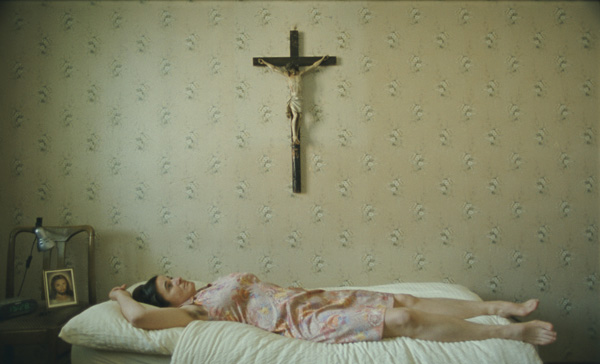![]() Ulrich Seidl’s “Paradise Trilogy” was originally conceived as a single film of interwoven stories following three female family members on a quest for fulfillment during their separate summer vacations. Split into three films, Love, Faith, and Hope have each won acclaim with their exploration of controversial themes. The first film, Love, competed for the Palme d’Or at Cannes, the second Faith won the Special Jury Prize at the Venice Film Festival in 2012, while Hope was nominated for the Golden Bear this year in Berlin.
Ulrich Seidl’s “Paradise Trilogy” was originally conceived as a single film of interwoven stories following three female family members on a quest for fulfillment during their separate summer vacations. Split into three films, Love, Faith, and Hope have each won acclaim with their exploration of controversial themes. The first film, Love, competed for the Palme d’Or at Cannes, the second Faith won the Special Jury Prize at the Venice Film Festival in 2012, while Hope was nominated for the Golden Bear this year in Berlin.
Paradise Faith opens with childless, middle-aged Anna Maria (Maria Hofstätter) in front of the crucifix thanking Jesus for his mercy while flagellating herself for her unchastity. Taking a vacation from her role as a radiography nurse, she has chosen to remain home alone in her spartan house in a suburb of Vienna, and to devote her time converting the neighborhood. On a pilgrimage of daily cold calls, while cradling a statue of the Virgin Mary, Anna Maria forces herself upon local residents, imploring them to embrace Catholicism and return to the path of virtue. Resolute and tenacious, she remains impervious to their ridicule, scorn, and sexual propositions on these visits that, together with her prayer group, punctuate her solitude.
After one such day, Anna arrives home to unexpectedly find her estranged husband, Nabil (Nabil Saleh), an Egyptian Muslim, home after a prolonged absence. She interprets his return as a test. A paraplegic confined to a wheelchair after an accident, Nabil expects Anna to perform her marriage duties, including sharing their marital bed. Steadfast in her faith, which was reignited by Nabil’s accident, Anna banishes Nabil to the couch and tends to his physical needs without affection. With desire subjugated, Nabil’s frustration mounts and their interfaith marriage breaks down in slow motion. A destructive cycle of domination and suppression results in cruelties that test Anna’s faith.
Co-written with Veronika Franz, Seidl’s regular collaborator (and wife), Paradise: Faith is filmed in Seidl’s signature style with purely diegetic sound. It’s an intense and heartbreaking study of repression and religious zeal in which Seidl lays bare his characters. Assisted by casting director Eva Roth, he mixes pros and first-time actors together again. In his first screen role, Saleh is incredible as the trapped and wounded husband. Hofstätter gives a painfully exposed and convincing performance as Anna Maria.
Blackly comic and deadly serious, Seidl creates a theater of the grotesque audaciously told with an objective detachment. Outwardly frigid, Anna Maria represses sexual feeling with acts of self-abnegation, but in a transgressive scene, her adoration is enacted carnally—she takes the crucifix into her bed and masturbates with it. In another, she encounters an open-air orgy at night and watches the unsimulated group sex with curiosity before fleeing in horror.
Anna’s world is rigidly constructed, and Andreas Donhauser and Renate Martin’s production design is exquisite in every minimal detail. Static, symmetrical composition by cinematographers Ed Lachman and Wolfgang Thaler is broken by a hand-held camera only during Anna’s missionary work. These evangelical house calls provide much dark humor. Rene Rupnik gives a satirical turn as an overweight and underdressed orphan, like an overgrown baby in baggy underpants, while Natalija Baranova’s volatile, lewd, drunk Russian cleaner claws at Anna. Moments of tenderness and vulnerability do shine through, all the more searing for Anna Maria and Nabil’s enmity. While she trims his nails in the bath, he reveals his sadness at his inability to give her sexual pleasure.
Seidl’s vision is fluidly edited by Christof Schertenleib, balancing the visual austerity and the turbulent emotions while underscoring the oppressive claustrophobia without cutting away from the authenticity of the action. Minimally and incisively, Seidl dissects the vulnerability beneath religious armor. Painful and affecting, Paradise Faith will resonate long after you leave the theater.







Leave A Comment